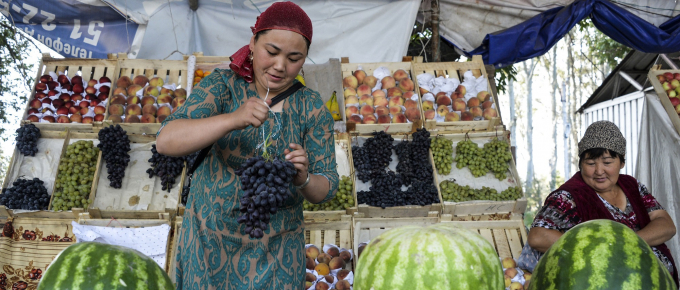June 15, 2025 | 04:35 GMT +7
June 15, 2025 | 04:35 GMT +7
Hotline: 0913.378.918
June 15, 2025 | 04:35 GMT +7
Hotline: 0913.378.918

A fruit market in Kyrgyzstan. Countries of Europe and Central Asia have a diverse and rich agricultural heritage
The Food and Agriculture Organization of the United Nations (FAO) today launched in the Europe and Central Asia region the Global Action on Green Development of Special Agricultural Products: One Country One Priority Product. This global initiative aims to make agrifood systems more efficient, inclusive, resilient, and sustainable.
Introduced by FAO’s Director-General in September 2021, One Country One Priority Product focuses on greening and promoting sustainable value chains of special agricultural products – local products with a special value that have not been mainstreamed in agricultural research and development. The FAO initiative brings them to the fore and accelerates their contribution towards improved food security, nutrition, and livelihoods.
At the virtual launch today, a broad range of actors from Europe and Central Asia learned about the One Country One Priority Product, laid out their priorities and comparative advantages in the food and agriculture sectors, and discussed opportunities for increased alignment. Participants included government representatives, development partners, research institutions, civil society, and the private sector.
“The One Country One Priority Product initiative seeks to optimize production processes, minimize negative impacts on the environment, and maximize productivity for a given product,” said FAO Deputy Director-General Beth Bechdol in her opening remarks. “The initiative blends traditional knowledge with science, innovation, and technology to redesign value chains for the integration of special agricultural products into national, regional, and even global markets.”
The focus on special agricultural products is strategic – FAO seeks to raise the attention they deserve.
“They are hidden treasures with unique qualities and special characteristics, associated with healthy diets, geographical locations, the sustainable farming practices that are used in their production, or the unique contribution they provide to cultural heritage,” said FAO economist Pedro Arias,. “These special products are often produced, processed, and traded locally by small-scale actors and marginalized producers, including women. These groups of vulnerable people are waiting for something like One Country One Priority Product to help them in their efforts to integrate their special products into growing markets,” he added.
Countries of Europe and Central Asia have diverse and rich agricultural heritage and production systems that, combined with green development, offer great opportunities for policy-makers, development partners, and value chain actors to join forces in transforming agrifood systems into being environmentally sustainable, socially inclusive, and economically viable.
Informed by the holistic vision of the FAO Strategic Framework for 2022–31, the One Country One Priority Product initiative is one of the solutions that FAO put forward to support the transformation to more efficient, inclusive, resilient, and sustainable agrifood systems for better production, better nutrition, a better environment, and a better life – leaving no one behind.
(FAO.org)

(VAN) Extensive licensing requirements raise concerns about intellectual property theft.

(VAN) As of Friday, a salmonella outbreak linked to a California egg producer had sickened at least 79 people. Of the infected people, 21 hospitalizations were reported, U.S. health officials said.

(VAN) With the war ongoing, many Ukrainian farmers and rural farming families face limited access to their land due to mines and lack the financial resources to purchase needed agricultural inputs.

(VAN) Vikas Rambal has quietly built a $5 billion business empire in manufacturing, property and solar, and catapulted onto the Rich List.

(VAN) Available cropland now at less than five percent, according to latest geospatial assessment from FAO and UNOSAT.

(VAN) Alt Carbon has raised $12 million in a seed round as it plans to scale its carbon dioxide removal work in the South Asian nation.

(VAN) Attempts to bring down the price of the Japanese staple have had little effect amid a cost-of-living crisis.